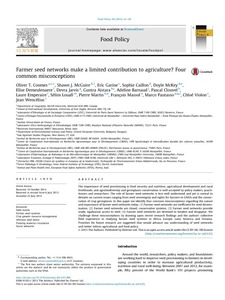Resource information
The importance of seed provisioning in food security and nutrition, agricultural development and rural livelihoods, and agrobiodiversity and germplasm conservation is well accepted by policy makers, practitioners and researchers. The role of farmer seed networks is less well understood and yet is central to debates on current issues ranging from seed sovereignty and rights for farmers to GMOs and the conservation of crop germplasm. In this paper we identify four common misconceptions regarding the nature and importance of farmer seed networks today. (1) Farmer seed networks are inefficient for seed dissemination. (2) Farmer seed networks are closed, conservative systems. (3) Farmer seed networks provide ready, egalitarian access to seed. (4) Farmer seed networks are destined to weaken and disappear. We challenge these misconceptions by drawing upon recent research findings and the authors’ collective field experience in studying farmer seed systems in Africa, Europe, Latin America and Oceania. Priorities for future research are suggested that would advance our understanding of seed networks and better inform agricultural and food policy.



